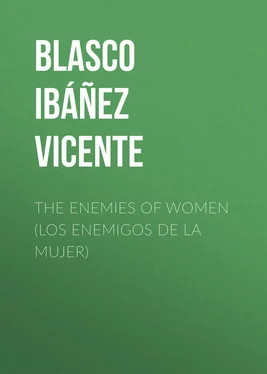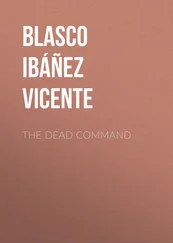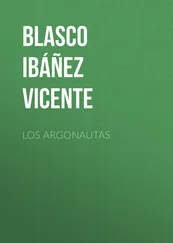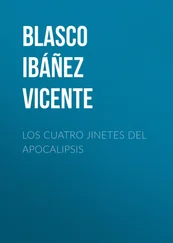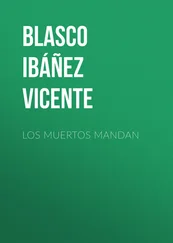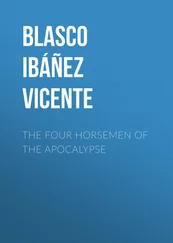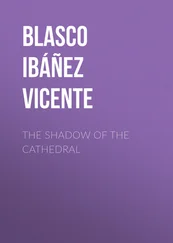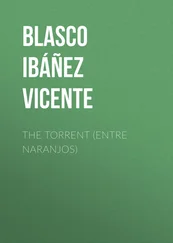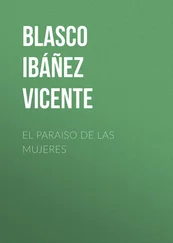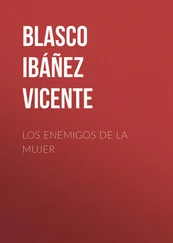Vicente Blasco Ibáñez - The Enemies of Women (Los enemigos de la mujer)
Здесь есть возможность читать онлайн «Vicente Blasco Ibáñez - The Enemies of Women (Los enemigos de la mujer)» — ознакомительный отрывок электронной книги совершенно бесплатно, а после прочтения отрывка купить полную версию. В некоторых случаях можно слушать аудио, скачать через торрент в формате fb2 и присутствует краткое содержание. ISBN: , Жанр: foreign_prose, foreign_antique, foreign_language, на английском языке. Описание произведения, (предисловие) а так же отзывы посетителей доступны на портале библиотеки ЛибКат.
- Название:The Enemies of Women (Los enemigos de la mujer)
- Автор:
- Жанр:
- Год:неизвестен
- ISBN:http://www.gutenberg.org/ebooks/38458
- Рейтинг книги:3 / 5. Голосов: 1
-
Избранное:Добавить в избранное
- Отзывы:
-
Ваша оценка:
- 60
- 1
- 2
- 3
- 4
- 5
The Enemies of Women (Los enemigos de la mujer): краткое содержание, описание и аннотация
Предлагаем к чтению аннотацию, описание, краткое содержание или предисловие (зависит от того, что написал сам автор книги «The Enemies of Women (Los enemigos de la mujer)»). Если вы не нашли необходимую информацию о книге — напишите в комментариях, мы постараемся отыскать её.
The Enemies of Women (Los enemigos de la mujer) — читать онлайн ознакомительный отрывок
Ниже представлен текст книги, разбитый по страницам. Система сохранения места последней прочитанной страницы, позволяет с удобством читать онлайн бесплатно книгу «The Enemies of Women (Los enemigos de la mujer)», без необходимости каждый раз заново искать на чём Вы остановились. Поставьте закладку, и сможете в любой момент перейти на страницу, на которой закончили чтение.
Интервал:
Закладка:
The Enemies of Women (Los enemigos de la mujer)
CHAPTER I
THE Prince repeated his statement:
"Man's greatest wisdom consists in getting along without women."
He intended to go on but was interrupted. There was a slight stir of the heavy window curtains. Through their parting was seen below, as in a frame, the intense azure of the Mediterranean. A dull roar reached the dining-room. It seemed to come from the side of the house facing the Alps. It was a faint vibration, deadened by the walls, the curtains, and the carpets, distant, like the working of some underground monster; but there rose above the sound of revolving steel and the puffing of steam a clamor of human beings, a sudden burst of shouts and whistling.
"A train full of soldiers!" exclaimed Don Marcos Toledo, leaving his chair.
"The Colonel is at it again, always the hero, always enthusiastic about everything that has to do with his profession," said Atilio Castro, with a smile of amusement.
In spite of his years, the man whom they called the Colonel sprang to the nearest window. Above the foliage of the sloping garden, he could see a small section of the Corniche railroad, swallowed up in the smoky entrance of a tunnel, and reappearing farther on, beyond the hill, among the groves and rose colored villas of Cap-Martin. Under the mid-day sun the rails quivered like rills of molten steel. Although the train had not yet reached this side of the tunnel, the whole country-side was filled with the ever-increasing roar. The windows, terraces, and gardens of the villas were dotted black with people who were leaving their luncheon tables to see the train pass. From the mountain slope to the seashore, from walls and buildings on both sides of the track, flags of all colors began to wave.
Don Marcos ran to the opposite window overlooking the city. All he could see was an expanse of roofs with no trace of Nature's touch save here and there the feathery green of the gardens against the red of the tiles. It was like a stage setting broken into a succession of wings: in the foreground, amid trees, isolated villas with green balustrades and flower-strewn walls; next, the mass of Monte Carlo, its huge hotels bristling with pointed turrets and cupolas; and hazy in the background, as though floating in golden dust, the rocky cliffs of Monaco, with its promenades; the enormous pile of the Oceanographic Museum; the New Cathedral, a glaring white; and the square crested tower of the palace of the Prince. Buildings stretched from the edge of the sea halfway up the mountains. It was a country without fields, with no open land, covered completely with houses, from one frontier to the other.
But Don Marcos had known the view for years, and at once detected the unfamiliar detail. A long, interminable train was moving slowly along the hillside. He counted aloud more than forty cars, without coming to the rear coaches still hidden in a hollow.
"It must be a battalion … a whole battalion on a war footing. More than a thousand soldiers," he said in an authoritative manner, pleased at showing off his keen professional judgment before his fellow guests, who, for that matter, were not listening.
The train was filled with men, tiny yellowish gray figures, that gathered at the car windows, doors, and on the running-boards with their feet hanging over the track. Others were crowded in cattle pens or stood on the open flat-cars, among the tanks and crated machine guns. A great many had climbed to the roofs and were greeting the crowds with arms and legs extended in the shape of a letter X. Almost all of them had their shirt sleeves rolled up to the elbows, like sailors preparing to maneuver.
"They are English!" exclaimed Don Marcos. "English soldiers on their way to Italy!"
But this information seemed to irritate the Prince, who always spoke to him in familiar language, in spite of the difference in their ages. "Don't be absurd, Colonel. Anybody would know that. They are the only ones who whistle."
The men still seated at the table nodded. Military trains passed every day, and from a distance it was possible to guess the nationality of the passengers. "The French," said Castro, "go past silently. They have had a little over three years of fighting on their own soil. They are as silent and gloomy as their duty is monotonous and endless. The Italians coming from the French front sing, and decorate their trains with green branches. The English shout like a lot of boys, just out of school, and in their enthusiasm, whistle all the time. They are the real children in this war; they go with a sort of boyish glee to their death."
The whistling sound drew nearer, shrill as the howling of a witches' Sabbath. It passed between the mountains and the gardens of Villa Sirena; and then went on in the other direction, toward Italy, gradually growing fainter as it disappeared in the tunnel. Toledo, who was the only one in the room to watch the train pass, noticed how the houses, gardens, and potagers on both sides of the track were alive with people, waving handkerchiefs and flags in reply to the whistling of the English. Even along the seashore the fishermen stood up on the seats of their boats and waved their caps at a distant train. The quick ear of Don Marcos distinguished a sound of footsteps on the floor above. The servants doubtless were opening the windows to join with silent enthusiasm in that farewell.
When only a few coaches were still visible at the mouth of the tunnel, the Colonel came back to his place at the table.
"More meat for the slaughter house!" exclaimed Atilio Castro, looking at the Prince. "The racket is over. Go on, Michael."
Under Toledo's watchful eye, two beardless Italian boys, unprepossessing in appearance, were serving the dessert at the luncheon.
The Colonel kept glancing over the table and at the faces of his three guests, as though he were afraid of suddenly noticing something that would show the lunch had been hastily arranged. It was the first that had been given at Villa Sirena for two years.
The master of the house, Prince Michael Fedor Lubimoff, who sat at the head of the table, had arrived from Paris the evening before.
The Prince was a man still in his youth, fresh with the well controlled vigor that is furnished by a life of physical exercise. He was tall, robust, and supple, of dark complexion, with large gray eyes, and a massive face, clean shaven. The scattered gray hairs at his temples seemed even more numerous in contrast with the blue-black of the rest. A number of premature wrinkles around the eyes, and two deep furrows running from his wide nostrils to the corners of his mouth, were the first indication of weariness in a powerful organism that seemed to have lived too intensely, in the mistaken confidence that its reserve of strength was endless.
The Colonel called him "Your Highness," as if Michael Fedor were a member of a ruling house, instead of a mere Russian prince. But this was when some one was present. It was a habit Don Marcos had adopted in the days of the late Princess Lubimoff, to maintain the prestige of the son, whom he had known since the latter was a child. In their intimate relations, when they were alone, he preferred to call him "Marquis," Marquis de Villablanca, and the Prince was never successful in disturbing, by his witticisms on the subject, the precedence thus established by Don Marcos in his terms of respect. The title of Russian Prince was for those who are dazzled by the lofty sound of titles, without being able to appreciate their respective merits, and origins; as for himself, the Colonel preferred something nobler, the title of Spanish Marquis, in spite of the fact that that title for Lubimoff was quite unknown in Spain, and lacked official recognition.
Toledo was well acquainted with Prince Michael's three guests.
Читать дальшеИнтервал:
Закладка:
Похожие книги на «The Enemies of Women (Los enemigos de la mujer)»
Представляем Вашему вниманию похожие книги на «The Enemies of Women (Los enemigos de la mujer)» списком для выбора. Мы отобрали схожую по названию и смыслу литературу в надежде предоставить читателям больше вариантов отыскать новые, интересные, ещё непрочитанные произведения.
Обсуждение, отзывы о книге «The Enemies of Women (Los enemigos de la mujer)» и просто собственные мнения читателей. Оставьте ваши комментарии, напишите, что Вы думаете о произведении, его смысле или главных героях. Укажите что конкретно понравилось, а что нет, и почему Вы так считаете.
